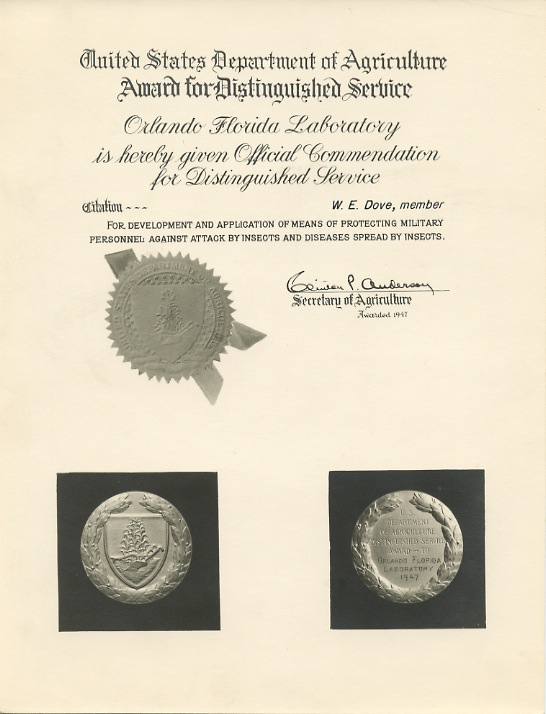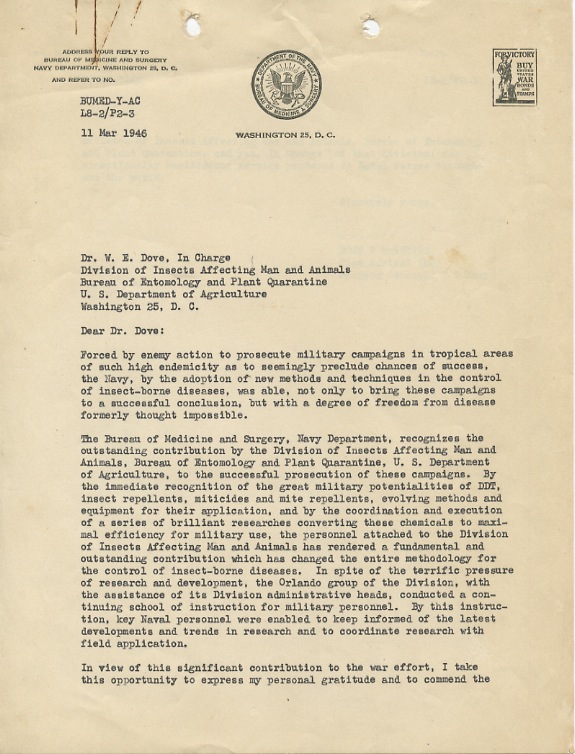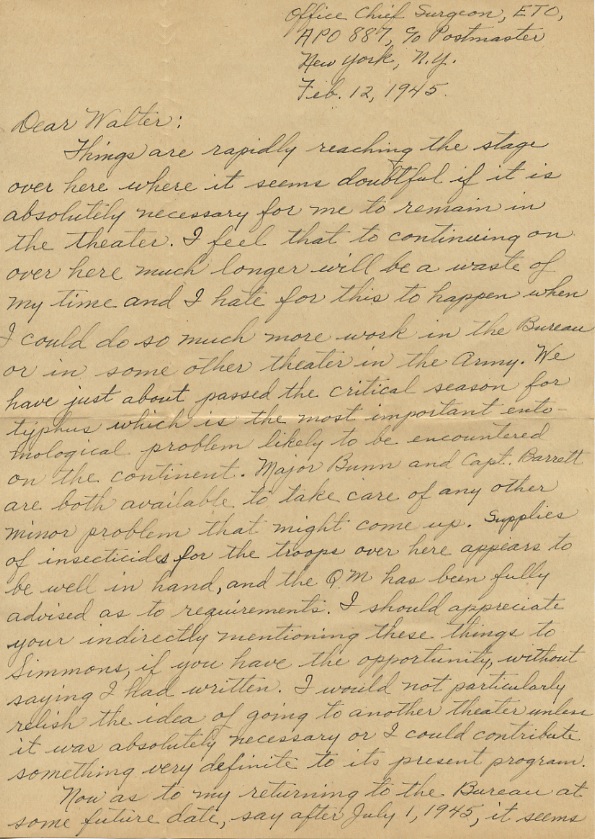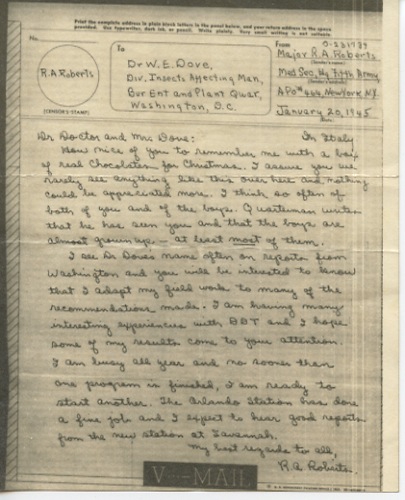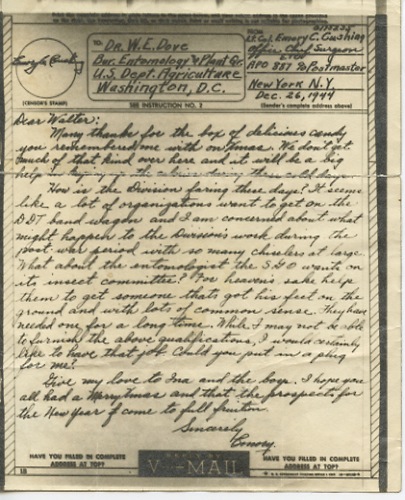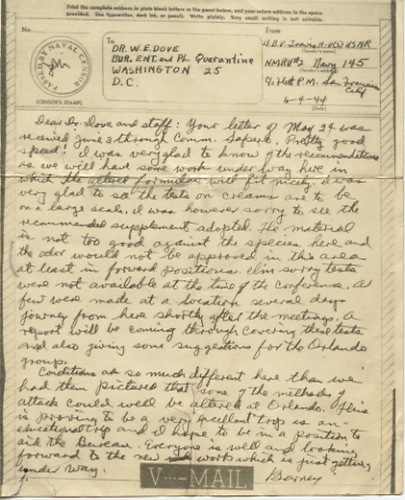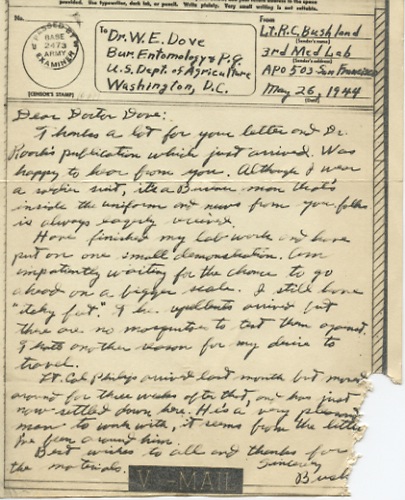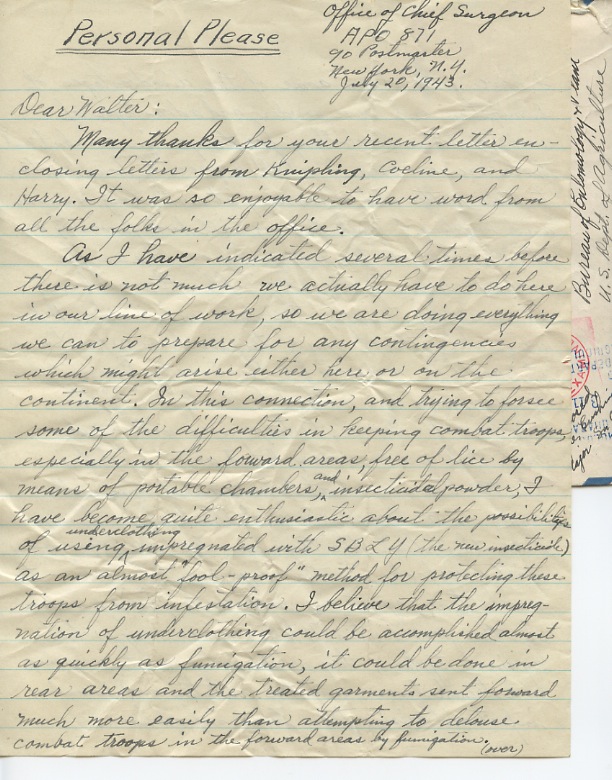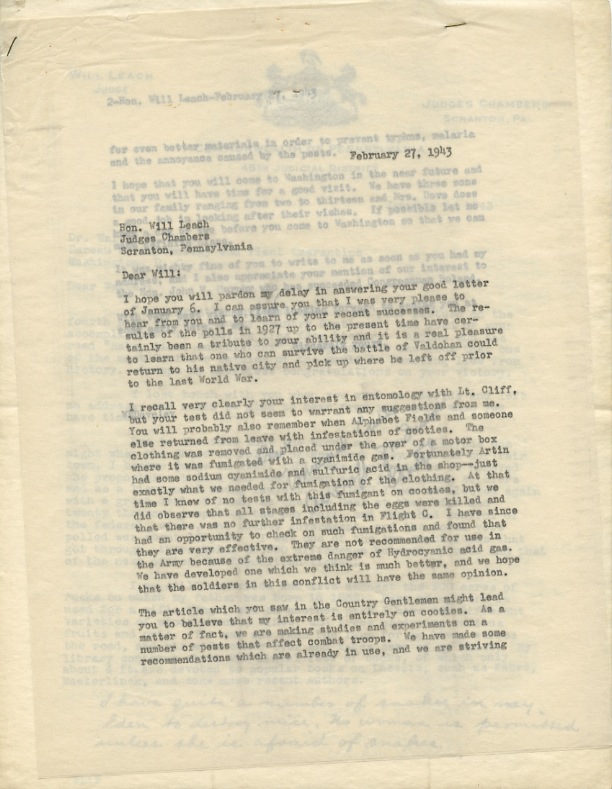Tag Archives: WWII
March 11, 1946
Letterhead from the Bureau of Medicine and Surgery, Navy Department, Washington, D.C.
11 Mar 1946
Dr. W. E. Dove, In Charge
Division of Insects Affecting Man and Animals
Bureau of Entomology and Plant Quarantine
U.S. Department of Agriculture
Washington 25, D.C.
Dear Dr. Dove:
Forced by enemy action to prosecute military campaigns in tropical areas of such high endemicity as to seemingly preclude chances of success, the Navy, by the adoption of new methods and techniques in the control of insect-borne diseases, was able, not only to bring these campaigns to a successful conclusion, but with a degree of freedom from disease formerly thought impossible.
The Bureau of Medicine and Surgery, Navy Department, recognizes the outstanding contribution by the Division of Insects Affecting Man and Animals, Bureau of Entomology and Plant Quarantine, U.S. Department of Agriculture, to the successful prosecution of these campaigns. By the immediate recognition of the great military potentialities of DDT, insect repellents, miticides and mite repellents, evolving methods and equipment for their application, and by the coordination and execution of a series of brilliant researches converting these chemicals to maximal efficiency for military use, the personnel attached to the Division of Insects Affecting Man and Animals has rendered a fundamental and outstanding contribution which has changed the entire methodology for the control of insect-borne diseases. In spite of the terrific pressure of research and development, the Orlando group of the Division, with the assistance of its Division administrative heads, conducted a continuing school of instruction for military personnel. By this instruction, key Naval personnel were enabled to keep informed of the latest developments and trends in research and to coordinate research with field application.
In view of this significant contribution to the war effort, I take this opportunity to express my personal gratitude and to commend the Division of Insects Affecting Man and Animals, Bureau of Entomology and Plant Quarantine, and you, In Charge of that Division, for exceptionally meritorious service rendered to Naval forces throughout the world.
Sincerely yours,
Ross T. McIntire
Vice Admiral (MC)
Surgeon General, U.S. Navy
February 12, 1945
Office of Chief Surgeon, ETO
APO 887, c/o Postmaster
New York, N.Y.
Feb. 12, 1945.
Dear Walter:
Things are rapidly reaching the stage over here where it seems doubtful if it is absolutely necessary for me to remain in the theater. I feel that to continue on over here much longer will be a waste of my time and I hate for this to happen when I could do so much more work in the Bureau or in some other theater in the Army. We have just about passed the critical season for typhus which is the most important entomological problem likely to be encountered on the continent. Major Bunn and Capt. Barrett are both available to take care of any other minor problem that might come up. Supplies of insecticides for the troops over here appear to be well in hand, and the Q.M. has been fully advised as to requirements. I should appreciate your indirectly mentioning these things to Simmons, if you have the opportunity, without saying I had written. I would not particularly relish the idea of going to another theater unless it was absolutely necessary or I could contribute something very definite to its present program.
Now as to my returning to the Bureau at some future date, say after July 1, 1945, it seems to me that the work of the Division has now increased to the point where it would be advantageous for both of us to be in the Washington office dividing the various phases of it, or some similar arrangement satisfactory to both of us. I should like to have any ideas you have along this line. I’m sure we will not have any difficulty in getting together on something when the time comes for me to return.
Deniza told me about all of you having scarlet fever. That was really tough and I hope you and the family are all recovered by now.
About the supply of live D. variabilis – our experiments which appeared promising at first did not prove out so it is likely now that we shall not need the specimens.
As a last thought, I wouldn’t mind staying in the Army in Washington for awhile.
Remember me to Ina and the boys and the folks there in the office.
Sincerely
Emory.
January 20, 1945
Army V-Mail.
Major R.A. Roberts
Med Sec, HQ Fifth Army
APO 464 New York, N.Y.
January 20, 1945
In Italy
Dr Doctor and Mrs. Dove:
How nice of you to remember me with a box of real chocolates for Christmas. I assure you we rarely see anything like this over here and nothing coudl be appreciated more. I think so often of both of you and of the boys. Quarterman writes that he has seen you and that the boys are almost grown up – at least most of them.
I see Dr. Dove’s name often on reports from Washington and you will be interested to know that I adapt my field work to many of the recommendations made. I am having many interesting experiences with DDT and I hope some of my results come to your attention. I am busy all year and no sooner than one program is finished, I am ready to start another. The Orlando Station has done a fine job and I expect to hear good reports from the new station at Savannah.
My best regards to all,
R.A. Roberts
Dec. 26, 1944
Army V-Mail.
Lt. Col. Emory C. Cushing
Office Chief Surgeon
APO 887 c/o Postmaster
New York N.Y.
Dec. 26, 1944
Dear Walter:
Many thanks for the box of delicious candy you remembered me with on Xmas. We don’t get much of that kind over here and it will be a big help in keeping up the calories during the cold days.
How is the Division faring these days? It seems like a lot of organizations want to get on the DDT band wagon and I am concerned about what might happen to the Division’s work during the post-war period with so many chiselers at large. What about the entomologist the SGO wants on its insect committee? For heaven’s sake help them to get someone that’s got his feet on the ground and with lots of common sense. They have needed one for a long time. While I may not be able to furnish the above qualifications, I would certainly like to have that job. Could you put in a plug for me?
Give my love to Ina and the boys. I hope you all had a Merry Xmas and that the prospects for the New Year come to full fruition.
Sincerely,
Emory
June 4, 1944
Navy V-Mail letter.
Lt. B.V. Travis H-V(S) USNR
NMRU#2 Navy 145
c/o Fleet P.M. San Francisco Calif.
Dear Dr. Dove and staff:
Your letter of May 24 was received June 3 through Comm. Sapeno. Pretty good speed! I was very glad to know of the recommendations as we will have some work under way here in which the altered formulae will fit nicely. I was very glad to see the tests on creams are to be on a large scale. I was however sorry to see the recommended supplement adopted. The material is not too good against the species here and the odor would not be approved in this area at least in forward positions. I’m sorry tests were not available at the time of the conference. A few were made at a location several days’ journey from here shortly after the meetings. A report will be coming through covering these tests and also giving some suggestions for the Orlando group.
Conditions are so much different here than we had them pictured that some of the methods of attack could well be altered at Orlando. This is proving to be a very excellent trip as an educational trip and I hope to be in a position to aid the Bureau. Everyone is well and looking forward to the new work which is just getting under way.
Barney
May 26, 1944
This is a piece of “V-Mail,” which the US military used during WWII. Troops would write their letters on the forms, which were then checked by censors before being copied to film to reduce the weight for air transport. The military would print the film once it arrived in the US, producing miniaturized copies of the original letters.
From Lt. R.C. Bushland
3rd Med Lab
APO 503 San Francisco
May 26, 1944
Dear Doctor Dove:
Thanks a lot for your letter and Dr. Roarke’s publication which just arrived. Was happy to hear from you. Although I wear a soldier suit, it’s a Bureau man that’s inside the uniform and news from you folks is always eagerly received.
Have finished my lab work and have put on one small demonstration. Am impatiently waiting for the chance to go ahead on a bigger scale. I still have “itchy feet.” The repellents arrived but there are no mosquitoes to test them against. That’s another reason for my desire to travel.
Lt. Col. Philips arrived last month but moved around for three weeks after that, and has just now settled down here. He’s a very pleasant man to work with, it seems from the little I’ve been around him.
Best wishes to all and thanks for the materials.
Sincerely
Bushland
July 20, 1943
Office of Chief Surgeon
APO 871
c/o Postmaster
New York, N.Y.
July 20, 1943
Personal Please
Dear Walter:
May thanks for your recent letter enclosing letters from Knipling, Coeline, and Harry. It was so enjoyable to have word from all the folks in the office.
As I have indicated several times before there is not much we actually have to do here in our line of work, so we are doing everything we can to prepare for any contingencies which might arise either here or on the continent. In this connection, and trying to forsee some of the difficulties in keeping combat troops, especially in the forward areas, free of lice by means of portable chambers, and insecticidal powder, I have become quite enthusiastic about the possibilities of using underclothing impregnated with SBLY (the new insecticide) as an almost “fool-proof” method for protecting these troops from infestation. I believe that the impregnation of underclothing could be accomplished almost as quickly as fumigation, it could be done in rear areas and the treated garments sent forward much more easily than attempting to delouse combat troops in the forward areas by fumigation.
I have jotted down some of the disadvantages of fumigation and louse powder, and advantages of impregnated underclothing for troops in combat and these are enclosed. I shall appreciate having your reaction to this matter and discussing it with Long, Simmons and Knipling. I think Knipling will look favorably on it. We could do the impregnating over here as the various solvents are available. It would only be necessary to ship the bulk insecticide. Before we could attempt any of this work over here, however, it would be necessary for the Surgeon General’s office to recommend the method to the Office of the Quartermaster Gneeral. Perhaps you will consider more tests are necessary but I am confident in the results secured at Orlando that they will apply on a larger scale. I think it is things like this that the American Typhus Commission will overlook in their experimental work – too much time spent on vaccines to the exclusion of other possibilities. While vaccines may protect against typhus, they would not prevent relapsing, and trench fevers, and the irritation and secondary infections arising from louse infestations.
Please note my new APO number and send any letters to me at that address.
Would it be possible for you to give me a list of the items that were shipped to me from the office there on or about December 1, 1942. I have gotten on the track of some of them but they have been scattered to various depots and I shall have trouble in getting them all together unless I have a complete list.
I am glad to learn that Harry may have the opportunity of going to the field for tests with repellents. This same thing should be being done in every theatre where we have troops, and against species which are known to occur in areas where we are likely to have troops. I am especially interested in the species occurring in the Near East and the Balkans. Tests with some of these species could be done in parts of Africa, Syria, Cyprus, and Palestine. I don’t see why they can’t use Bunn, Barrett, and me for such work. We could get back here in 24 hours if necessary. At present we are abstracting all the most important available literature on insects of medical importance in Europe, the Balkans, and Mediterranean areas.
Please remember me to Ina and the boys and all the folks in the Bureau.
Sincerely,
Emory.
May 29, 1943
Stamped “Restricted.”
Gen’l Medical Laboratory
APO 519 c/o Postmaster
New York, New York
May 29, 1943
Dear Walter:
May thanks for your letter of March 12 and the information contained in the enclosures. The report on the results of tests on scabies is very interesting and I have discussed it with the Dermatologist who is in charge of that disease in our forces. I am interested to learn whether the benzyl benzoate, alcohol, SAT formula would be effective against motile lice and louse eggs on the body. Have any tests along this line been done? I notice in Circular Letter No. 33 Office Surgeon General, Feb. 2, 1943 “Treatment and control of certain tropical diseases,” a formula for delousing the bodies of infested personnel. Would this be one that was developed at Orlando? The possibilities of the impregnated clothing especially with the new insecticide seems like the answer to a prayer, and appears not to be outside the limits of practicability for the protection of all troops. I should very much like to test it on a large scale with troops but this appears to be out of the question here as the incidence of infestation is almost nil. For some time, I have been urging that I or some one else be sent to areas where problems are more acute and where practical tests could be run with new recently developed materials under a variety of conditions. So far, it hasn’t apparently been deemed fit to release me for work of that kind, but to keep me here for odd bits of consultant service in my line of work and more or less to be on hand should something develop. Maybe this is as it should be but it is certainly not what I would expect. There is so much yet to be learned on the practical side for the new methods.
The box of books and Freon cylinders which you so kindly sent has never reached me and I suppose they went to the bottom somewhere along the way.
I am anxioius to see Gen. B. and Buxton when they return in order to get first hand information on the work there. The OSRD reports are coming through fine now and I read them with intense interest. If you could send one or two pounds of SAT we could do a good test on scabies. Eddy’s report didn’t mention what kind of alcohol was used. Would you let us have that information?
How is everything going in the Division? Deniza tells me that Coeline didn’t get her promotion. It’s a darned shame but I know you did everything possible for her.
Give my regards to everyone there and the rest of the folks in the Division when you see them. Remember me to Ina and the boys.
Sincerely yours
Emory C. Cushing
Attached note forwarding the letter to Knipling: “If you care to answer & send SAT that you have tested, we will ship from here. W.E. Dove.”
February 27, 1943
February 27, 1943
Hon. Will Leach
Judges Chambers
Scranton, Pennsylvania
Dear Will:
I hope you will pardon my delay in answering your good letter of January 6. I can assure you that I was very pleased to hear from you and to learn of your recent successes. The results of the polls in 1927 up to the present time have certainly been a tribute to your ability and it is a real pleasure to learn that one who can survive the battle of Valdahon could return to his native city and pick up where he left off prior to the last World War.
I recall very clearly your interest in entomology with Lt. Cliff, but your test did not seem to warrant any suggestions from me. You will probably also remember when Alphabet Fields and someone else returned from leave with infestations of cooties. The clothing was removed and placed under the cover of a motor box where it was fumigated with a cyanimide gas. Fortunately Artin had some sodium cyanimide and sulfuric acid in the shop – just exactly what we needed for fumigation of the clothing. At the time I knew of no tests with this fumigant on cooties, but we did observe that all stages including the eggs sere killed and that there was no further infestation in Flight C. I have since had an opportunity to check on such fumigations and found that they are very effective. They are not recommended for use in the Army because of the extreme danger of hydrocyanic acid gas. We have developed one which we think is much better, and we hope that the soldiers in this conflict will have the same opinion.
The article which you saw in the Country Gentleman might lead you to believe that my interest is entirely in cooties. As a matter of fact, we are making studies and experiments on a number of pests that affect combat troops. We have made some recommendations which are already in use, and we are striving for even better materials in order to prevent typhus, malaria and the annoyance caused by the pests.
I hope that you will come to Washington in the near future and that you will have time for a good visit. We have three sons in our family ranging from two to thirteen and Mrs. Dove does a good job in looking after their wishes. If possible let me know a day or two before you come to Washington so that we can make definite plans.
It was mighty fine of you to write to me as soon as you had my address, and I also appreciate your mention of our interest to the Hon. John W. Murphy who has succeeded Congressman Boland.
With very best wishes, and looking forward to seeing you at some early date, I am,
Sincerely yours,
Walter

